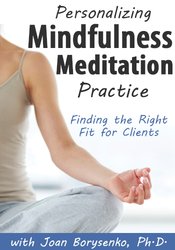Description
As meditation practice is increasingly being integrated into psychotherapy, therapists too often see it as a one-size-fits-all remedy. But these practices actually include a range of tools that can be more effective when tailored to a client’s history, personality organization, religious or spiritual orientation, cultural background, and presenting problems. We’ll explore how to help assure the right fit among three different families of practices (categorized by Dahl, Lutz, and Davidson) to better address the problems clients present. You’ll focus on exploring:
- The different families of practice, including attentional approaches that strengthen self-regulation, constructive approaches that enhance emotional wellbeing and healthy thinking, and deconstructive approaches that lead to insight
- What kind of practices are most useful with various clinical issues, including stress-related disorders, addictions, trauma, anxiety, depression, and interpersonal struggles
- The distinctive clinical applications of concentration meditation, centering prayer, and mindfulness practices
- How to expand your personal understanding of meditation by directly experiencing a range of contemplative practices
CPD
CPD
- PESI Australia, in collaboration with PESI in the USA, offers quality online continuing professional development events from the leaders in the field at a standard recognized by professional associations including psychology, social work, occupational therapy, alcohol and drug professionals, counselling and psychotherapy. On completion of the training, a Professional Development Certificate is issued after the individual has answered and submitted a quiz and course evaluation. This online program is worth 4.0 hours CPD for points calculation by your association.
Faculty
Joan Borysenko, PhD, is a Harvard-trained cell biologist, licensed psychologist, and spiritual educator. A pioneer in mind/body medicine and psychoneuroimmunology, she’s president of Mind-Body Health Sciences, LLC and a New York Times bestselling author of 17 books.
Speaker Disclosures:
Financial: Dr. Joan Borysenko is the founder and president of Mind-Body Health Sciences, LLC. and is an adjunct professor at Saybrook University. She is a published author and receives royalties. Dr. Borysenko receives a speaking honorarium and recording royalties from PESI, Inc. She has no relevant financial relationships with ineligible organizations.
Non-financial: Dr. Joan Borysenko serves on the board for the National Wellness Institute, Psychology Today, the Center for Mind-Body Medicine, and others. For a complete list, please contact info@pesi.com.
Outline
- Welcome
- Meditation Exercise
- Overview of Objectives
- Typology of Meditation and When to Use
- Mind-Body Meditation Beginning
- Meditation as Medicine
- Emerging Era of Personalization
- The Body-Mind
- The Relaxation Response
- Dawn of Mindfulness Meditation
- Mindfulness-Based Stress Reduction
- Emotional Intelligence, Cognitive-Behavioral
- How Can We Personalize Meditation Practice?
- Starting with Basics
- Brain Science
- Meditative Styles
- Attentional
- Meta-Awareness
- Narrowing, Open-Focused
- Types
- Constructive
- Alterations of Thoughts and Emotions
- Types
- Deconstructive
- Self-Inquiry and Insight
- Types
- Self-Help and Spirituality
- Teaching Meditation and Personalization
- Motivation
- Listen to Client
- Daily Progress Cards
- 5 Basic Types of Meditation
- Instructed Meditation Practice
- Questions & Comments
- Demonstration Regarding Cognitive Dialogue
Objectives
- Explore the different families of practice, including attentional approaches that strengthen self-regulation, constructive approaches that enhance emotional wellbeing and healthy thinking, and deconstructive approaches that lead to insight
- Explore what kind of practices are most useful with various clinical issues, including stress-related disorders, addictions, trauma, anxiety, depression, and interpersonal struggles
- Explore the distinctive clinical applications of concentration meditation, centering prayer, and mindfulness practices
- Explore how to expand your personal understanding of meditation by directly experiencing a range of contemplative practices
Target Audience
Psychologists, Physicians, Addiction Counselors, Counselors, Social Workers, Marriage & Family Therapists, Nurses, and other Behavioral Health Professionals

